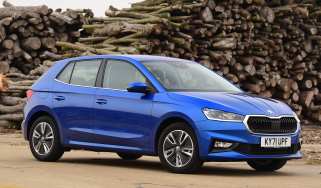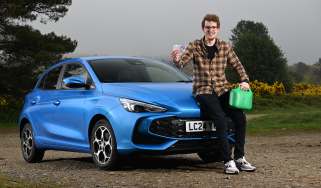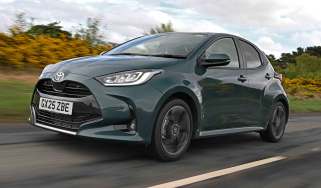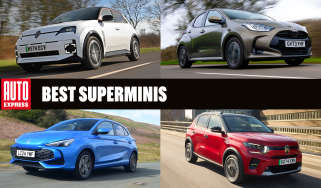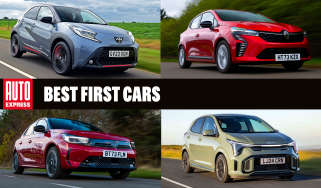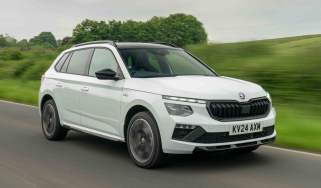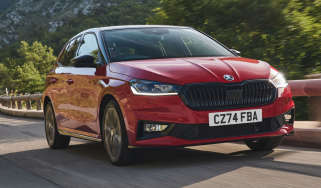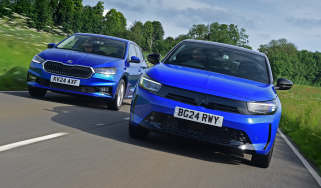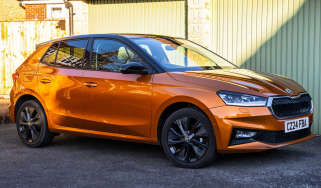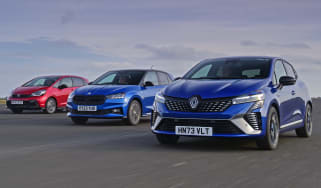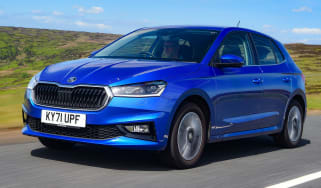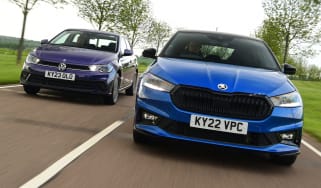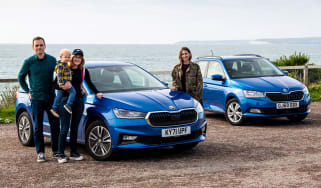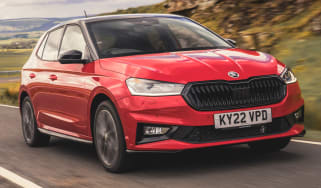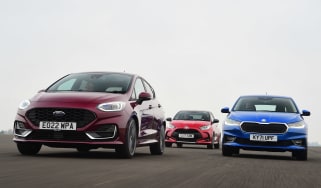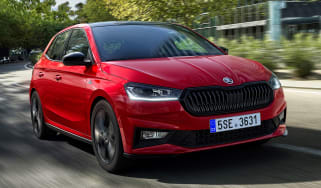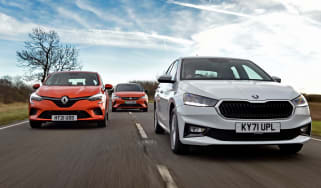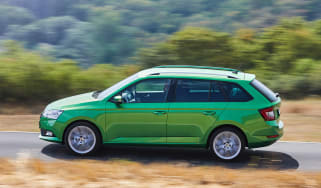Skoda Fabia review: a sensible supermini with a big boot
If you’re after an affordable supermini with plenty of space, comfort and on-board technology, then the Skoda Fabia won’t disappoint

The Czech car brand hasn’t lost sight of what has made its Skoda Fabia supermini so successful after more than 20 years in production. More practical than ever, with greater passenger space and modern onboard tech, the Fabia has fine-tuned what was already a pretty compelling package into one of the best superminis you can buy.
Throw in the fourth-generation Fabia’s sharper styling, reassuring levels of safety kit and some keen pricing, which undercuts its Volkswagen Polo sibling, and buyers might find it hard to resist the appeal of Skoda’s latest supermini.
About the Skoda Fabia
It’s fair to say that today’s superminis are not the compact runabouts they once were. Always a popular choice for its mix of affordability, practicality, and ease of use, the humble small hatch has faced a new era of safety regulation, combined with buyers demanding improved quality, extra space, and greater comfort. All of this has led to more sizable models being designed and brought to market.
Lucky, then, that this five-door supermini benefits from using the same MQB-A0 platform as its Polo and Ibiza cousins. This architecture also underpins Skoda’s Scala family car and Kamiq small SUV, and its lightness helps to keep the Fabia’s weight roughly the same as its predecessor’s. A more impressive feat when considering the new car is 111mm longer and almost 48mm wider.
Used - available now

2017 Skoda
Fabia
33,263 milesAutomaticPetrol1.2L
Cash £10,700
2019 Skoda
Fabia
14,036 milesAutomaticPetrol1.0L
Cash £12,221
2021 Skoda
Fabia
24,898 milesManualPetrol1.0L
Cash £10,907
2019 Skoda
Fabia
25,721 milesManualPetrol1.0L
Cash £9,947As a testament of how competent the Fabia is, it came out on top in our twin test review against the VW Polo; we saw the Fabia as being ‘virtually impossible to overlook”, and it was only pipped to the post by the Renault Clio in a subsequent triple test that also featured the Honda Jazz because the Renault had a more competitive finance deal.
Under the skin, Skoda has kept things pretty simple in terms of engine options. The entry-level 79bhp MPI unit helps keep insurance affordable, but we’d recommend either the 94bhp or 114bhp 1.0-litre TSI turbocharged engine options, which offer more punch. A 148bhp 1.5-litre TSI petrol sits at the top of the range in the most expensive Monte Carlo trim.
The entry-level 79bhp 1.0-litre and 94bhp turbocharged 1.0-litre uses a five-speed manual gearbox, while the more powerful 114bhp model has a six-speed manual as standard, or the option of a seven-speed DSG automatic transmission. The 148bhp model only comes with the DSG auto.
There are four trim levels: SE Comfort, SE L, Colour Edition, and Monte Carlo. The standard kit across the Fabia range is pretty generous, with 15-inch alloy wheels, LED headlights, rear parking sensors, air conditioning, a DAB radio, and plenty of safety tech.
The Fabia SE Comfort model is priced at around £20,000, which means it’s competitive with many of its close rivals, while most mid-spec cars come in between £20,000 and £22,000. The sweet spot in the range is arguably the 114bhp six-speed manual version in either SE Comfort or Colour Edition trim, although we can see the appeal of SE L trim if you feel you need the extra tech features that come with the SE L, such as integrated sat-nav, cruise control and a bigger infotainment touchscreen.
Engines, performance and drive
The previous generation Fabia was a decent car to drive, although it didn’t offer much entertainment once out of town and tackling the twisty stuff. The latest model utilises the VW Group’s MQB-A0 platform, which offers increased rigidity and less weight than the old PQ26 architecture, helping to improve handling and make the Fabia a little more fun.
Ultimately, though, the Fabia focuses on comfort rather than performance and delivers an easy, relaxing drive. The soft suspension results in more body roll while cornering than expected, but the suspension in the Fabia maintains a smooth low-speed ride. It's quiet in the cabin most of the time, although we did notice some tyre roar when we were travelling at motorway speeds.
Buyers may be disappointed with Skoda’s decision not to offer a sporty vRS model, but the three-cylinder turbocharged engines that make up the core of the range will be strong enough for most buyers needs. The ubiquitous 1.5-litre TSI unit that’s used across various VW Group brands, is also available from Colour Edition trim and above.
We’re yet to try the revised 114bhp 1.0 TSI petrol engine, but we anticipate it’ll be similarly smooth as its 108bhp 1.0-litre TSI predecessor. We believe it should be a good match for the Fabia, providing sufficient extra power and torque over the 94bhp version so that you won’t have to work it quite so hard to make decent progress. Its extra gear ratio should help make it quieter on longer motorway trips by keeping the revs lower.
The five- and six-speed manual gearboxes are typically light, but remain reassuringly accurate and precise when shifting.
0-62mph acceleration and top speed
You probably won’t be buying a Fabia for its sprinting ability. The basic 79bhp MPI powerplant takes 15.7 seconds to get from 0 to 62mph, which should be fine around town but it will struggle to reach motorway speeds swiftly.
The turbocharged TSI engines are worth the extra outlay if you can afford it. The 94bhp variant brings an increased torque figure of 175Nm (compared to 93Nm for the MPI), with acceleration from 0-62mph improving to a much more respectable 10.7 seconds.
Opting for the 114bhp car increases torque to 200Nm and reduces the sprint time to 9.3 seconds flat for the six-speed manual and 9.7 seconds for the DSG automatic version. Meanwhile, the 148bhp 1.5-litre model benefits from 250Nm of torque and manages 0-62mph in 8.0 seconds.
MPG, CO2 and running costs
Skoda has opted not to include mild- or plug-in hybrid tech in the latest iteration of the Fabia. However, it has improved the efficiency of the existing MPI and TSI petrol engines. Choose a model in SE Comfort trim, and Skoda claims you’ll see around 54.3mpg for the 79bhp engine, and 55.4mpg for both the 94bhp and 114bhp 1.0-litre TSI engines with a manual gearbox. The economy dips to 53.3mpg if you go for the 114bhp engine with the seven-speed DSG automatic on the WLTP combined cycle.
After covering nearly 9,000 miles in our Skoda Fabia 1.0 TSI long-term test car, we averaged 55.4mpg, which is impressive considering the lack of hybrid technology. That said, if fuel economy is a priority for you, during our group test against the Skoda Fabia and Ford Fiesta, the full-hybrid Toyota Yaris managed to return 68.8mpg, compared to the 55.4mpg we got in the Skoda and the Ford's 58.9mpg.
Emissions across the range are reasonable, with 115g/km from 94bhp and 114bhp 1.0-litre TSI engines with a manual gearbox, to 119g/km for the 79bhp MPI manual. Opting for the automatic 114bhp version raises emissions to 120g/km, while the most potent 148bhp 1.5-litre emits 125g/km.
Benefit-in-Kind tax rates range between 28 to 30 per cent, which isn’t bad for a pure petrol car, but isn’t as low as what you’ll find from the hybrid Clio and Yaris rivals, or all-electric alternatives such as the Peugeot E-208 or Vauxhall Corsa Electric.
Insurance
Insurance premiums for the Fabia shouldn't be too expensive – the entry-level 79bhp SE Comfort engine is in group 4 (out of 50), the higher-powered 94bhp engine in the same trim is in group 11, and the 114bhp version is in group 15. The top-spec 148bhp variant in Monte Carlo specification is in group 20.
In comparison, the Renault Clio 89bhp TCe 90 version starts in group 10, while the E-Tech hybrid with 138bhp starts in group 15.
Check if your car needs an MoT and view its complete history with our MoT History Checker...
Depreciation
Residual values for the Skoda Fabia supermini remain competitive with rivals. The 114bhp Monte Carlo maintains 54 per cent of its value after three years or 36,000 miles, while the entry-level 79bhp SE Comfort proves to be the least desirable in the range and holds on to only 46 per cent of its value.
If you want a supermini that holds on to its value even better, you’ll need to consider the Audi A1. The best-performing model in the range is the 30 TFSI S Line, which maintains almost 60 per cent of its value over the same period.
To get an accurate valuation on a specific model check out our free car valuation tool...
Interior, design and technology
The fourth-gen Skoda Fabia is a bigger car than its predecessor and, with its sharper exterior styling, cuts a more modern shape on the road. The front end includes Skoda’s latest grille and swept-back headlights, along with active cooling vents in the lower bumper that can shut to improve efficiency when travelling at cruising speeds.
At the rear, Skoda has included wider light clusters, a tailgate spoiler and the brand script is written across the boot lid, which all helps inject some much-needed flair to the Fabia’s appearance. The stylish theme continues inside, with the cabin finished in surprisingly high-quality materials and a clear, well-organised dash layout. It all combines to deliver an appealing package, although we feel the Peugeot 208 still just about edges the Fabia for interior charm.
The rotary air-con controls used in SE Comfort and Colour Edition are blissfully straightforward to use on the move. The upgraded dual-zone climate controls that come as standard on SE L and above aren’t quite so easy to use because beyond the two dials to adjust the temperature, you’ll need to delve into the touchscreen if you want to adjust the fan speed or the direction of airflow. This seems needlessly complicated when you consider Skoda’s ethos of functionality.
The high standard of kit is a highlight with the Fabia. The SE Comfort specification brings 15-inch alloy wheels, LED headlights, a multi-function steering wheel, height-adjustable front seats, an 8.25-inch central touchscreen with a DAB radio and wireless Apple CarPlay and Android Auto connectivity, plus rear parking sensors.
If you’re after improved tech, the Colour Edition model adds the Virtual Cockpit digital instrument display, which is also used in several Audi models, plus a few model-specific exterior colour options.
The high-end SE L has a bigger 9.2-inch touchscreen with sat-nav, plus keyless entry and start. The top-spec Monte Carlo version includes metallic or pearl effect paint as standard, along with 17-inch alloys, black exterior trim, front sports seats and aluminium pedals.
Sat-nav, stereo and infotainment
The Fabia gets the same up-to-date infotainment technology that’s used across other VW Group brands. The standard 8.25-inch touchscreen controlling the in-car media looks smart, with sharp graphics, although it could be quicker to load certain functions. Higher-spec SE L models and above feature the Amundsen infotainment set-up, with a larger 9.2-inch display (pictured above) that makes things easier to read, and standard sat-nav. The large on-screen tiles help you navigate the car’s assorted settings.
Colour Edition trim and above adds a 10.25-inch Virtual Cockpit digital instrument display, with a variety of useful screen layouts and information that is easy to read and switch between while on the move. We think it’s the best set-up available compared to any of the systems you'll find in the Fabia's closest rivals.
Wireless phone connectivity is standard, but you’ll need to add the Charging pack that’s available on Colour Edition trim and above to get wireless phone charging.
Practicality, comfort and boot space
Skoda only offers the Fabia as a five-door model: the previous estate version is no longer on the menu. Buyers seeking a few more creature comforts and useful standard kit (such as manual lumbar adjustment, cruise control, the 10.25-inch digital instrument cluster mentioned in the previous section, and electric rear windows) might want to upgrade to the Colour Edition trim, but the base SE Comfort trim is still well equipped and includes rear parking sensors, a multifunction steering wheel, height adjustment for the driver’s seat and air conditioning.
If you want to add further equipment, there are various optional packs that allow you to specify items such as heated seats, a heated windscreen, a wireless smartphone charging pad, and front parking sensors.
If you need to fit child seats, there are the usual two ISOFIX mounts for the outer rear seats, and another set on the front passenger seat, too.
Size and dimensions
The latest Fabia has a bigger footprint than its predecessor, measuring 4,108 mm long, 1,780 mm wide, and 1,459 mm tall. In comparison, the Renault Clio isn’t as long at 4,050mm, although it is slightly wider at 1,798mm.
Leg room, head room & passenger space
The Fabia’s extra 111mm in length means it’s more spacious in the cabin than before. The driver and front passenger should easily find a comfortable seating position. At the same time, those travelling in the rear benefit from exceptional knee room – we think equal to that found in the Mercedes A-Class. Headroom is good, too, even if you specify the optional panoramic glass roof.
That said, it may be a squeeze to seat three across the back, as you'd expect in any supermini, but we found that the Fabia's rather large transmission tunnel does eat up a lot of foot space. Rear passengers get various sizes of pockets on the back of the front seats, with one regular-sized map pocket and some shallower ones designed for smartphones.
Boot space
The previous Fabia model had a decent 330-litre boot, including handy luggage hooks and useful compartments for assorted oddments. The fourth-generation model offers similar practical touches but with an increased 380-litre load space, beating the 355-litre of space offered in the SEAT Ibiza or the 328-litres found in the Dacia Sandero. If you fold the rear seats, the luggage capacity in the Fabia rises to 1,190 litres.
It’s a marker of how close today’s superminis are to more traditional hatchbacks that you’ll find a similarly sized 380-litre boot in the latest Mk8 Volkswagen Golf.
Reliability and safety
It may be a supermini, but the Skoda Fabia comes with big-car levels of safety kit. The entry-level SE Comfort model has an autonomous emergency braking system (AEB). It helps avoid or mitigate potential collisions with other vehicles, pedestrians, and cyclists at low speeds by automatically applying brakes if an impending collision is detected. The base car also features Lane Assist, which can identify an unintended lane departure and automatically correct the steering.
Adaptive cruise control is an option as part of the Assisted Drive package available from Colour Edition and above, along with a Park Assist system and a Safety Package, which includes knee airbags for the driver and rear side airbags.
The fourth-generation Fabia achieved the full five-star rating when it was put through Euro NCAP's battery of crash safety tests in 2021. It received an 85 per cent score for adult occupant protection and 81 per cent in the child occupant protection category.
The Fabia didn't feature in our 2023 Driver Power owner satisfaction survey, although the Kodiaq SUV finished fourteenth place on a 75-car list. The Skoda brand was voted into 20th position in the best brands poll – a repeat of 2022's performance.
Warranty
Skoda offers a three-year/60,000-mile warranty with the Fabia, along with three years of European-wide roadside assistance. At an additional cost, the warranty can be extended for an extra two years.
Servicing
Servicing your Fabia will depend on what type of driving you undertake and how many miles you cover. There is either a fixed or flexible approach, with the former advising a service annually or every 10,000 miles. This is recommended if your vehicle covers mainly shorter journeys in towns or cities, or whether you regularly carry heavy loads and use frequent high revs/heavy braking.
The flexible service regime is more suited if your Fabia covers a higher mileage, with minimal loads and driven in a more constant, efficient manner. A service light will show between 9,000 and 20,000 miles to indicate that an inspection is required.
Skoda offers service plans to help with paying for scheduled maintenance. If you buy a new Fabia, or a model under a year old, you can pay for it upfront amount or in monthly instalments to cover your first two services.
Skoda Fabia Alternatives
The breadth of skills offered by established supermini rivals such as the Renault Clio and Vauxhall Corsa means the gap between this segment and traditional family hatchbacks such as the Ford Focus and VW Golf is closer than ever. With extra competition from its SEAT Ibiza and Volkswagen Polo stablemates and the likes of the Hyundai i20, Mazda 2, Peugeot 208 and Toyota Yaris offering strong appeal, Skoda’s fourth-generation Fabia certainly has its work cut out.





